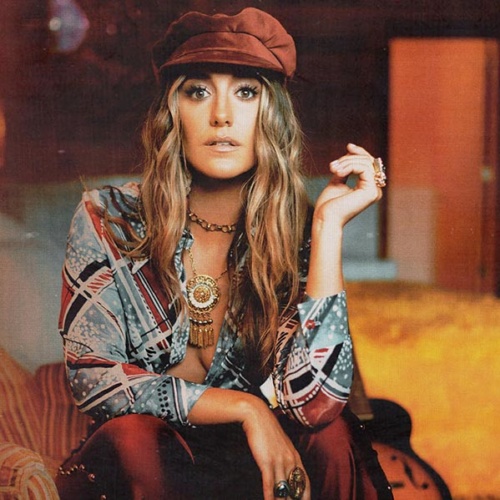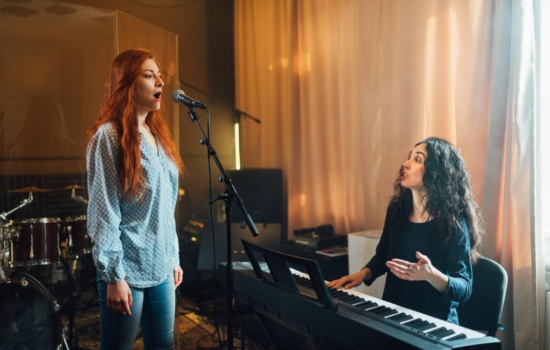Music Career Finder
Survey Start
Singer

How To Become a Singer
- A singer vocalizes the melody and harmony in a song
- A singer performs live (solo or with other musicians) and records vocals in a studio
- Aspiring singers should take vocal lessons
- It’s important to network with singers and musicians, record 1-3 demos to share, and learn an instrument
- A career singer typically works weekend nights
- The median income for a singer is $39.14 per hour
- Career Description
- Salary
- Career Outlook
- Career Path
- Experience & Skills
- Education & Training
- Sources
- References
Career Description
A singer, or vocalist, sings the vocal parts in a piece of music – the melody, harmony, melismatic singing, and vocal riffs.
Experienced singers use certain vocal techniques to control the volume, pitch, and tone of their voice to convey the lyrics and emotion of the song.
What Does a Singer Do?
Professional singers who perform on stage sing along with an accompanist, a full band, or a pre-recorded backing track.
Professional singers who record vocals in the studio work with audio engineers, producers, and artists to deliver emotional performances for their own or others’ recorded songs.
Many singers specialize in a specific genre, like pop, jazz, rock, musical theater, or opera. But many singers can sing in several different styles, which makes them more versatile and in demand.
A Day In the Life of a Singer
Here’s what a typical day looks like for Grammy-nominated singer-songwriter Violet Skies:
- First thing in the morning, she answers emails from her manager about other artists wanting to record her songs, gig details, tour planning
- Late morning: go to the studio to work on music
- Daytime during show season: rest, run through her set, go to rehearsal/soundcheck
- Nighttime during show season: perform locally or do gigs on tour
As a singer, you should expect to work most weekend nights because that’s when performances typically happen.
You may also need to move to a music city like Nashville, New York, Los Angeles, Austin, or somewhere similar. This will give you plenty of places to perform and offer a rich music community to get involved in.
Salary
Singers (and/or musicians) make about $39.14 per hour1, but this can vary widely because there are so many ways to build a career as a singer.
Here’s how singers make money…
Singing on a Recording
If you look at singers offering their services on SoundBetter, you’ll see they’re charging anywhere from $200-500 to sing on a song.
But starting out, you may have to offer your services for free or low cost until you’ve built up a good portfolio.
Performing Live
Performers earn a flat fee or a portion of ticket sales. So as a singer, you will probably have to split the profits with your band or accompanist.
Depending on the venue, the event, and how many other people you have to share the profits with, you could earn as little as $25 up to hundreds of dollars per gig.
Writing Songs
Earning money as a songwriter is harder than the previous two income streams, but it’s still doable.
When you write a song, here’s how you can make money from it:
- Royalties from streams/sales of the recording of the song
- Performance royalties when you or anyone else sings in a public setting (must register the song with a Performance Rights Organization)
- Upfront payment and backend royalties when your song is licensed for use in a TV show, ad, movie, or video game
Hey, what do you think about trying our new Music Career HelperMusic Career Helper really quick? It’s totally free and could help get your career moving fast! Give it a try. It’s totally free and you have nothing to lose.
Career Outlook
There’s a persistent but misguided belief that anyone with a great natural singing voice could instantly become successful as a performer in the music business. This is simply not true.
What might look like a “big break” is always the culmination of many small breaks.
So, building a career as a singer involves truly building.
Grace Davidson said singing is a great career if you’re willing to put in the work.
“From my personal experience,” she said, “it has been a good career but it’s hard work and you have to be prepared to work hard and travel around the world doing auditions, performances, and recordings.”
In the beginning, you may not make much money, if any at all.
But you must continue to improve your singing abilities, keep performing and seeking out recording gigs, and network with other singers, musicians, and music industry professionals.
This is how you will make a career as a singer.
Career Path
As with most careers in the music industry, becoming a singer can look differently for each person.
But in general, here’s the typical career path of a singer…
1. Take singing lessons
To get on the path to a singing career, start with some vocal training.
To find the right singing teacher, ask around for recommendations from others and try out some lessons with a few different people. Some teachers will offer the first lesson for free.
2. Learn an instrument
You don’t need to know how to play an instrument. But it can definitely help you write songs, perform live, and post videos on social media without relying on another musician.
3. Attend concerts
You can learn a lot by watching experienced singers perform on stage.
This can also be a great way to meet other singers and musicians to collaborate with.
4. Record a demo(s)
Record 1-3 demos of songs that showcase your singing ability.
These can be songs you’ve written or cover songs, as long as they are in your vocal range and highlight your strengths.
You could either book a short session with a local recording studio, or you could get some basic recording equipment to record at home.
5. Share your demo(s)
Once you have good demo recordings, set up an Electronic Press Kit that you can share with:
- Musicians and bands you’d want to perform with
- Artists who may want to hire you for backing vocals
- Record labels, managers, and talent scouts
6. Post on social media
Many singers get their start by posting covers on social media.
Record yourself playing a cover then post the whole video as well as snippets to share in bite-sized clips.
7. Consider going to school for singing
You definitely don’t need to attend a traditional school to become a singer.
But if you can afford it, it can help you learn not just singing techniques but methods for navigating the music business. It can also connect you with other singers and musicians.
Experience & Skills
Let’s look at what kind of skills you’ll need to become a career singer…
Singing Skills
- Intonation: Are you singing “in tune?” (Different people sometimes hear this differently.)
- Diction: Can we understand the words?
- Vocal Quality: Is your voice pleasant to listen to? Are you controlling your breath, posture, and other aspects of vocal production to get a good “sound?” Does your voice sound healthy, or is it constrained and thin sounding?
- Stage Presence: Do you seem comfortable on the stage? Are your attire, movements, and facial expressions all appropriate for the song and the musical setting?
- Rhythmic Interpretation: Does it “swing?” Is the groove or rhythmic feel correct for the musical style and tempo?
- Dynamics: Are you using them to advantage? Dynamics is not only loud and soft; it includes articulations and transitory elements such as vibrato, glissandos, or cadenzas. It’s basically a catch-all term to describe that special “something” that is hard to put your finger on but keeps you listening and engaged.
- Song Choice and Prep: Is the song a good song for you to sing? Is it a good audition song? Are the lyrics memorized? Do you have it in the right key, and is it arranged to fit the time allotted for the audition?
Other Skills
- Proper microphone technique (audio engineers and producers can help you with this)
- Learn an instrument
- Know basic music theory
- Read sheet music
- Be easy to work with
Education & Training
Most professional singers began singing at home, in the car, in the shower, in church, in school, or wherever they can.
But if you’re ready to level up your training as a singer, here are a few options…
Take Singing Lessons
Singing lessons from an experienced teacher can help you improve a lot faster than trying to learn on your own.
This is a person who will tell you what you need to work on, how you have improved, and someone that will answer your specific questions.
Go To School
Many traditional universities offer singing programs, and if you can afford college, this can be a helpful path. You’ll learn basic to advanced singing techniques, how the music business works, and you’ll be able to network with other singers and musicians.
Learn From YouTube
Tons of singing coaches have posted tutorials and tips on YouTube videos. If you’re driven enough, you can learn the basics of singing techniques and voice care through videos.
Sources

Grace Davidson
Grace Davidson is a British soprano who specializes first and foremost in the performance and recording of Baroque music. Grace grew up in a house whose hallway was entirely filled by a grand piano which was being stored for a friend of the family–music was physically unavoidable. She learned the piano and the violin but it was singing that she loved best.
Taken to Cats when she was three years old she sang along throughout or, rather, whenever her mother’s hand wasn’t clamped over her mouth. And it was her singing that won her a scholarship to the Royal Academy of Music where she won the Early Music Prize. Since then she has worked as a soloist with leading Baroque ensembles, under the batons of Sir John Eliot Gardner, Paul McCreesh, Philippe Herreweghe and Harry Christophers.
Her discography includes a decade of recordings with The Sixteen, many of which feature her as soloist–Handel’s Jeptha (as Angel), Dixit Dominus, Monteverdi’s Vespers of 1610, Pianto della Madonna, Acis and Galatea (as Galatea) and the Lutheran Masses of Bach. On Radio Three’s Building a Library, her singing in Fauré’s Requiem (with the London Symphony Orchestra and Tenebrae, Nigel Short conducting) was reviewed by Richard Morrison quite simply: “Grace Davidson’s Pie Jesu is matchless.”
Grace’s purity of tone has attracted many of the leading contemporary composers to write for her, most notably Max Richter, who chose her as the solo singer for many of his works, such as Sleep. This piece–lasting all night–has now been performed all over the world, including a performance in 2019 on the Great Wall of China. Recent solo recordings for Signum Records are Vivaldi & Handel, a disc of sacred solo cantatas with the Academy of Ancient Music, and John Dowland: First Booke of Songes Or Ayres with lutenist David Miller.

Violet Skies
You’ll be familiar with Violet Skies without realising it. Having spent the last few years writing for other artists around the world, as well as founding sheWrites, a global series of female-only writing camps, Violet Skies is setting up her stall alongside her artist peers; a Welsh Singer-Songwriter with ambition as big as her voice.
Growing up in a village in Wales, UK, she’s a self-confessed nerd, perfectionist and has known since the age of 4 that music was her future. Violet Skies, (adopting her grandmother’s name) writes “pop with teeth” and co-produces all her music; a combination of searingly emotional vocals, uncomfortably honest lyrics about her relationships, and infectious melodies.
The resulting output walks a fine line between making you cry about an ex you thought you were over–and laugh about the one you’re glad got away.
If it’s not already clear, she’s not content with the definitions of what it is to be a female Singer-Songwriter. She’s somewhere between Adele and Robyn; a product of her parents’ eclectic musical tastes and a 90’s childhood.

Lainey Wilson
Pinned as an “Artist to Watch” in 2020 by Pandora, The Boot, and Sounds Like Nashville and included in CMT’s “Next Women of Country” program, Wilson kicked off the year by making her Grand Ole Opry debut—a dream come true for the Baskin, Louisiana native.
Hailing from the small farming community, Wilson moved to Nashville in a bumper-pull camper trailer to pursue a career in music and has been carving her own unique place in the country music landscape ever since, garnering praise for her “unabashedly down-home and unflappably worldly” (NPR) style and exhibiting “just enough scars and pragmatism to write great, universal country songs” (Taste of Country).
Produced by GRAMMY Award-winning mastermind Jay Joyce, Wilson’s music has had multiple TV placements with Paramount’s hit series Yellowstone and her current single “Things A Man Oughta Know” continues to gain traction across radio and streaming platforms alike, garnering over 15 million streams to date and repeatedly landing on SXMTheHighway’s Hot 30 Countdown.
References
- 1. " Musicians and Singers". U.S. Bureau of Labor Statistics. published: August 29 2024 . retrieved on: Oct 21 2024





